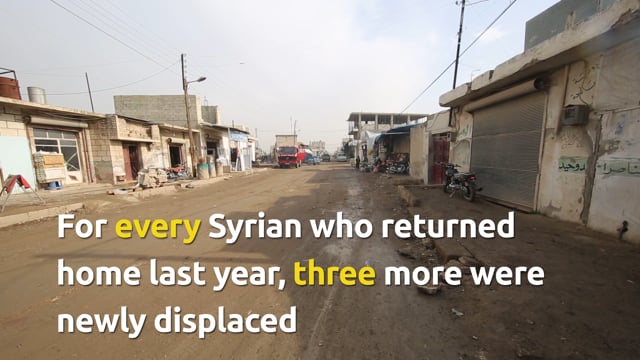Three Syrians newly displaced for every one who returned home last year
Hundreds of thousands of Syrians risk being pushed to return in 2018 despite ongoing violence, warn aid agencies


Hundreds of thousands of refugees are at risk of being pushed back to Syria in 2018, despite ongoing violence and bombing endangering their lives, leading humanitarian agencies warn in a report released today.
The warning comes amid a global anti-refugee backlash, harsher conditions in neighbouring countries hosting Syrians, and Syrian government victories in the conflict that have fuelled misleading rhetoric suggesting Syria is safe for refugees to return.
The report by the Norwegian Refugee Council (NRC), Save the Children, Action Against Hunger, CARE International, Danish Refugee Council (DRC), and International Rescue Committee (IRC) warns that governments in Europe, the United States and the region are closing borders and forcing Syrian refugees back – or openly discussing measures for it – putting many lives at risk.

Despite Syria’s changing military situation, the country is still volatile and dangerous as recent military escalations in Idlib and Eastern Ghouta demonstrate.
The report found that while the number of Syrians returning – mostly from internal displacement inside Syria – rose from 560,000 to 721,000 between 2016 and 2017, for every returnee there were three more newly displaced because of the violence. Some 2.4 million people in Syria – more than 8,000 every day – fled their homes in the first nine months of 2017 and the UN predicts a further 1.5 million Syrians will be displaced in 2018.
Although 2017 saw reduced violence in some areas of Syria, it increased in other regions with hundreds of civilians being killed or injured. Aerial bombing, mortars and booby traps are still daily hazards, including in populated areas.
Yet with conditions deteriorating for many refugees in the region, and few resettlement opportunities in other countries, many seeking safety could end up taking dangerous and illegal routes to reach alternative countries or feel pushed to return to Syria.
NRC Secretary General Jan Egeland said: “The majority of Syrian refugees and internally displaced live under terrible conditions and want to return home, but their return must be informed, voluntary, safe, assisted and protected. Now, return would neither be safe nor voluntary for the vast majority who fled the war and the violence.
“We stand ready to assist safe and voluntary return when there are lasting ceasefires, rights are protected and societies can be rebuilt without fear. Currently, even in certain so-called de-escalation areas, we've seen bloodshed, targeting of hospitals and schools, and death.”
The report also calls for greater action to help refugees in Jordan, Lebanon and Turkey. While these countries have shown remarkable generosity in the past, the lack of political will from wealthy countries to help has created a feeling that closing borders and returning refugees is justified.

Wealthier countries have failed to meet commitments made at conferences in London in 2016 and Brussels in 2017.
In 2017, the UN High Commissioner for Refugees (UNHCR) more than halved submissions for resettling Syrian refugees to rich countries compared with the previous year. The US administration’s actions to cap the resettlement quota and barring Syrian refugees account for much of the fall in numbers, but other nations have failed to step up.
Politicians in Europe, notably in Denmark and Germany, are now discussing the deportation of refugees to Syria. Yet, to date, only three per cent of vulnerable Syrian refugees have been resettled in wealthy countries.



.jpg)


.jpg)










.png)



